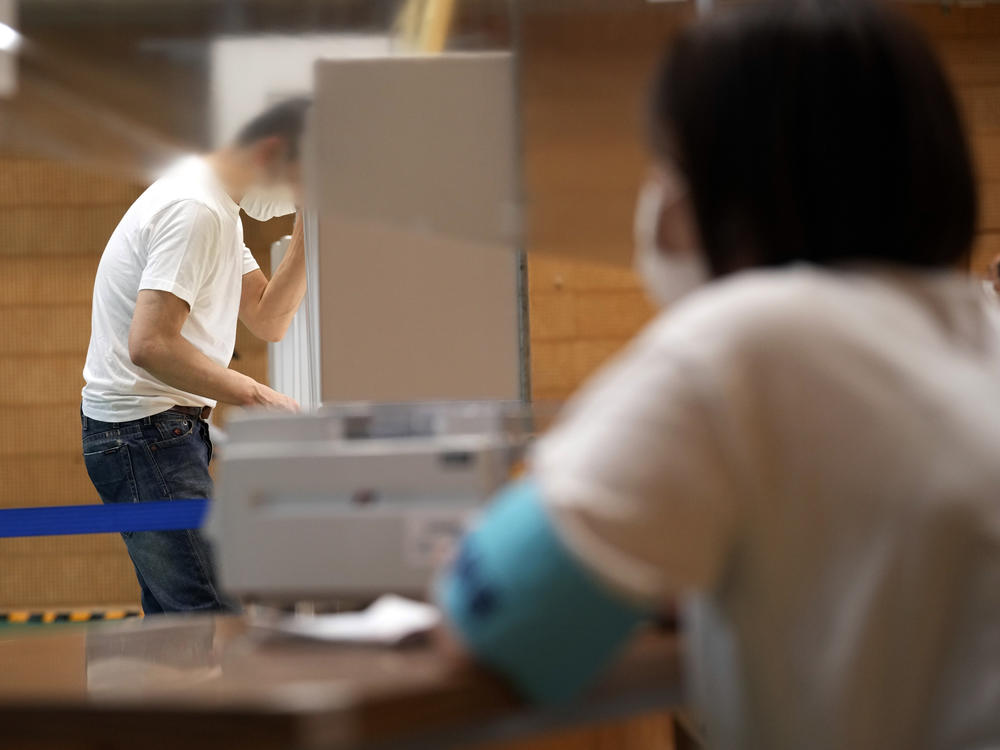Section Branding
Header Content
Japan votes for key election in shadow of Abe assassination
Primary Content
TOKYO — Japanese went to the polls Sunday in the shadow of the assassination of former Prime Minister Shinzo Abe, who was gunned down while making a campaign speech. Abe's governing party appeared to be cruising to a major victory.
As people voted, police in western Japan sent the alleged assassin to a local prosecutors' office for further investigation. A day earlier a top regional police official acknowledged possible security lapses that allowed the attacker to get so close and fire a bullet at the still-influential former Japanese leader.
In a country still recovering from the shock, sadness and fear of Abe's shooting — the first former or serving leader to be assassinated in postwar Japan — polling started for half of the upper house, the less powerful of Japan's two-chamber parliament.
Abe was shot in Nara on Friday and airlifted to a hospital but died of blood loss. Police arrested a former member of Japan's navy at the scene. Police confiscated a homemade gun and several others were later found at his apartment.
The alleged attacker, Tetsuya Yamagami, told investigators he acted because of Abe's rumored connection to an organization that he resented, police said, but had no problem with the former leader's political view. The man had developed hatred toward a religious group that his mother was obsessed about and that bankrupted a family business, according to media reports, including some that identified the group as the Unification Church.
Abe's body, in a black hearse accompanied by his wife, Akie, returned to his home in Tokyo's upscale Shibuya, where many mourners, including Prime Minister Fumio Kishida and top party officials, paid tribute. His wake and funeral are expected in coming days.
Nara prefectural police chief Tomoaki Onizuka on Saturday said that Abe's assassination was the "greatest regret" in his 27-year career. He said problems with security were undeniable, that he took the shooting seriously and will review the guarding procedures.
Abe's assassination ahead of Sunday's parliamentary election shocked the nation and raised questions over whether adequate security was provided for the former prime minister.
Some observers who watched videos of the attack noted a lack of attention in the open space behind Abe as he spoke.
Experts also said Abe was more vulnerable standing on the ground level instead of atop a campaign vehicle, a standard for premier-class politicians, but that option was reportedly unavailable due to his hastily arranged visit to Nara.
Mitsuru Fukuda, a crisis management professor at Nihon University, said police were seen focusing frontward and paying little attention to what was behind Abe, noting that the suspect was approaching the former leader unnoticed until he fired the first shot.
"Clearly there were problems," Fukuda said.
The first shot narrowly missed Abe and hit an election vehicle. The second entered from his upper left arm damaged his neck artery, causing massive bleeding and death.
Fukuda said that election campaigns provide a chance for voters and politicians to interact because "political terrorism" was extremely rare in postwar Japan. It's a key democratic process, but Abe's assassination could prompt stricter security at crowded events like campaigns, sports games and others.
On Saturday, when party leaders went out for their final appeals under heightened security, there were no more fist-touches — a COVID-19 era alternative to handshakes — or other close-proximity friendly gestures they used to enjoy.
After Abe's assassination, Sunday's election had a new meaning, with all political leaders emphasizing the importance of free speech and their pledge not to back down to violence against democracy.
"We absolutely refuse to let violence shut out free speech," Kishida said in his final rally in northern city of Niigata on Saturday amid tightened security. "We must demonstrate that our democracy and election will not back down to violence."
Copyright 2022 NPR. To see more, visit https://www.npr.org.

